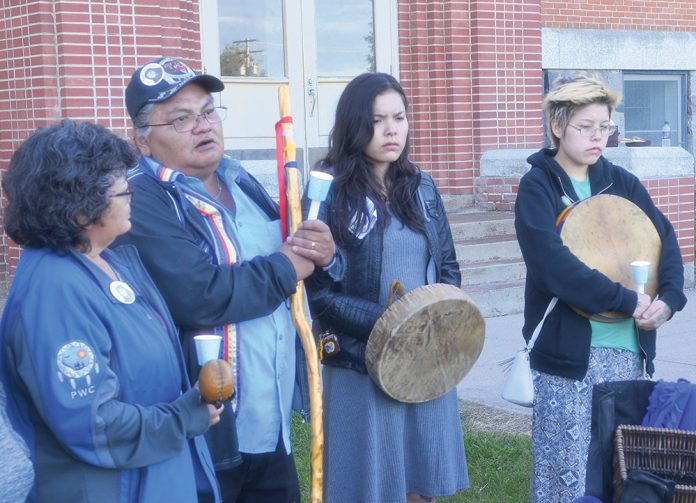
Carson Poitras, the stepfather of missing La Ronge woman Happy Charles, stepped to a microphone in Regina Thursday. Joined by Charles’s mother, he addressed chiefs gathered for the Assembly of First Nations Annual General Assembly.
“We would rather see the commissioners carry on,” he said. “We have to start healing.”
Poitras was weighing in on a debate that’s dividing First Nations all over Canada. Arlen Dumas, a grand chief from Manitoba, was set to propose a motion calling for the resignation of the remaining commissioners on the National Inquiring into Missing and Murdered Indigenous Women and Girls.
After heated debate, that motion failed. But the conference passed a weaker resolution demanding a “reset” of the inquiry and more support for families.
The successful resolution was proposed by Elaine Johnston, chief of the Serpent River First Nation. It directed the Assembly of First Nations to ask the government to “reset and change the mandate and process of the national inquiry.” It also called for the elimination of policy barriers, a renewed focus on policing issues and efforts to make the process “less legalistic.”
As the chiefs debated amendments, they hashed out their funding demands. They want more money to improve engagement between the commission and families, and to provide more support for those at risk. Much of the criticism of the inquiry so far has focussed on communication gaps that have left families feeling ignored.
Johnston said her resolution grew out of discussions with those grieving and looking for loved ones.
“It was a very emotional evening,” she said of the most recent session. “I heard very clearly from the families that it is not working.”
Poitras spoke on Johnston’s resolution. He expressed concern about the word “reset.” He was afraid that families might lose time. And for the Charles family, time is precious.
“If we do a reset, that’s two years gone,” he said.
Poitras, and others, were also worried about families who’ve already given their testimony in the Yukon. He questioned whether they’d have to go through the process all over again.
Johnston clarified that she’s not calling for an end to the inquiry, or the resignation of the commissioners. She said that she didn’t want to “re-traumatize” those who have already spoken. She just wants to see significant reform.
But Grand Chief Arlen Dumas proposed a more radical solution. His resolution asked National Chief Perry Bellegarde to meet with Prime Minister Trudeau. At that meeting, Bellegarde would be directed to “inform him” that the commissioners “must be replaced” with new leadership that puts families first.
“We cannot be complacent or tolerant of people who have not delivered,” Dumas said.
That attracted opposition from the chief of the Federation of Sovereign Indigenous Nations, Saskatchewan’s Bobby Cameron. He specifically addressed the plight of the Charles family, saying they “need to heal.”
“We cannot afford to potentially lose two years,” Cameron said. “During those two years, how many are we going to lose, men and women, because we’re going to replace the commissioners?
“Things are flawed, but we can fix it. We can do it together.”
Cameron and Poitras’s position carried the day. When the votes rolled in, about 40 per cent of the delegates rejected Dumas’s motion.
Poitras said his trip to Regina gave him the chance to share with other families who have endured the same struggles he’s experiencing. He called them “newfound friends.” Chief Cameron, he said, understood where they were coming from.
He seemed humbled by his experience addressing the chiefs.
“I was very honoured… that they gave me the opportunity to speak at the mic to the assembly,” he told the Daily Herald. “The whole MMIW thing, we can’t let it stop.”

